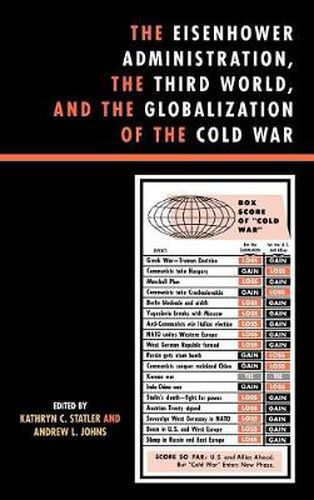Readings Newsletter
Become a Readings Member to make your shopping experience even easier.
Sign in or sign up for free!
You’re not far away from qualifying for FREE standard shipping within Australia
You’ve qualified for FREE standard shipping within Australia
The cart is loading…






In the United States, the Cold War is often remembered as a two-power struggle. However, increasing globalization during that time meant nations across the world became involved in the conflict. During the Eisenhower administration, American officials struggled to respond to the dual threats of communism and nationalism as decolonization swept through the Third World during the 1950s and changed the nature of the Cold War and U.S. foreign relations with those nations. As the Cold War increasingly became a zero-sum game, the Third World became the primary battleground in the ideological, economic, and political struggle between Washington and Moscow. Indeed, as these essays demonstrate, the Eisenhower administration placed an extremely high priority on victory in the Third World and seemed willing to go to virtually any length to ensure that countries in Africa, Asia, the Middle East, and the Americas remained aligned with the forces of democracy and capitalism. Relying on formerly unavailable archival research from many nations, the scholars in this volume systematically assess the impact of the globalizing Cold War and the process of decolonization on the Eisenhower administration’s foreign policy. Intended for diplomatic historians and readers interested in the Cold War, this book is a major contribution to an under-studied aspect of that conflict.
Contributions by: Michael R. Adamson, David L. Anderson, Nathan J. Citino, Peter L. Hahn, Andrew L. Johns, Robert J. McMahon, James H. Meriwether, Kenneth A. Osgood, Chester J. Pach Jr., Jason C. Parker, John Prados, James F. Siekmeier, Kathryn C. Statler, and Yi Sun
$9.00 standard shipping within Australia
FREE standard shipping within Australia for orders over $100.00
Express & International shipping calculated at checkout
In the United States, the Cold War is often remembered as a two-power struggle. However, increasing globalization during that time meant nations across the world became involved in the conflict. During the Eisenhower administration, American officials struggled to respond to the dual threats of communism and nationalism as decolonization swept through the Third World during the 1950s and changed the nature of the Cold War and U.S. foreign relations with those nations. As the Cold War increasingly became a zero-sum game, the Third World became the primary battleground in the ideological, economic, and political struggle between Washington and Moscow. Indeed, as these essays demonstrate, the Eisenhower administration placed an extremely high priority on victory in the Third World and seemed willing to go to virtually any length to ensure that countries in Africa, Asia, the Middle East, and the Americas remained aligned with the forces of democracy and capitalism. Relying on formerly unavailable archival research from many nations, the scholars in this volume systematically assess the impact of the globalizing Cold War and the process of decolonization on the Eisenhower administration’s foreign policy. Intended for diplomatic historians and readers interested in the Cold War, this book is a major contribution to an under-studied aspect of that conflict.
Contributions by: Michael R. Adamson, David L. Anderson, Nathan J. Citino, Peter L. Hahn, Andrew L. Johns, Robert J. McMahon, James H. Meriwether, Kenneth A. Osgood, Chester J. Pach Jr., Jason C. Parker, John Prados, James F. Siekmeier, Kathryn C. Statler, and Yi Sun